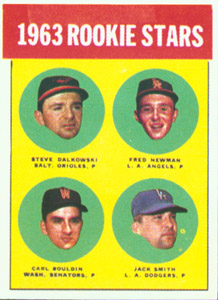Unfortunately, Dalkowski had two major
weaknesses that kept him from great success:
- He was a boozer.
- Even
when he was sober, he had severe control
problems. He didn't have typical right-left problems. He
could usually get it over the plate, but sometimes it was 40 feet
over the plate.
In one Eastern League
game, Dalkowski struck out 27 and walked 16 while throwing 283 pitches. On
August 31, 1957, he threw a one hitter and struck out 24 batters in a minor
league game - and lost! He also issued 18 walks in that
game, hit four very unlucky guys, threw six wild pitches,
and allowed 9 runs. He finished that year with an average
of 18 strikeouts per game, but actually walked more than
he struck out. In his minor league career, Dalkowski had 1,396
strikeouts in 995 innings, but he also issued 1,354 walks.
He had finally started to get his heater under control in
1962, after coming under the tutelage of none other than the legendary
Earl Weaver, who was then managing in the O's farm system. According to
Weaver, as quoted in
"From 33rd Street to Camden Yards", Dalkowski had one 55 inning stretch for Elmira in 1962
when he struck out 104, gave up only 11 runs, and "didn't walk many."
The following year, Dalkowski had gone to Spring training with the
Orioles, and had been absolutely unhittable. He was so impressive that he had made the
big club, and had even been pictured on a 1963 baseball
card (pictured above). Unfortunately, Dalkowski missed his one chance at
the Big Show when his
late Spring elbow injury got him sent down to Rochester. He
never made it back up because he was never the same pitcher after the
injury.
In 1965, only two years after having come so close to the
big leagues, he was picking
apricots for a living.
When the O's cut him loose, he had a drinking problem,
limited mental ability (according
to Weaver), and no skills unrelated to baseball. He ended up toiling as a farm laborer for nearly three
decades in Oildale, Calif. He moved to Oklahoma City in
1992, and when his wife died in 1994, Steve's sister and one of his
former catchers, Frank Zupo, brought him home to New England. Dalkowski
is still alive, living now in his home town of New Britain,
Connecticut, residing in the Walnut Hill Health Centre, but he isn't well, his health shattered by
all the years of alcohol
abuse. Here is a
2005 interview with him.
Memorable quotes and
stories about Steve:
- Former
Yankees manager Bob Lemon said his favorite Dalkowski exploit happened in Miami's Bobby Maduro Stadium when
Lemon actually witnessed Steve hit
a guy in the back with a pitch. What's so unusual about that? The guy was standing in line to
buy a hot dog!
- "He
was the hardest thrower I ever saw, and that includes
Nolan Ryan and Sandy Koufax, all of them," said
Orioles general manager Pat Gillick, who was Dalkowski's
roommate at Elmira, N.Y., in 1962. "It's a shame he
never made it. If this guy could have mastered it, he
would have been the greatest reliever in history. He
would had saved 50 or 60 games a season. The ball
exploded out of his arm."
- Dalkowski's greatest compliment came from Ted Williams. The
Orioles were playing the Red Sox in spring training at
Miami and Williams watched the New England phenom throw
to hitters in the cage. Williams called for a catcher,
had the batting cage taken away, jumped in and yelled,
"Throw as hard as you can, kid." "He swung
at 30 pitches and didn't hit one fair, but he fouled a
bunch," Dalkowski said. Williams claimed he didn't
even see the first pitch and was "damned" if
he'd face the kid again, unless forced to do so in a
game.
|
DVD info from Amazon.
-
Widescreen
letterbox. 1.85:1.
-
Clear
print, excellent picture quality, but no
significant extras.
-
A
deleted scene has been re-inserted.
-
Trailers
and music video.
|
|
- Doug
Harvey went on to become a top National League umpire and
remembers working one game while Dalkowski was at
Stockton. "He fanned the first nine hitters he faced
and was leading 2-0. Facing the 10th guy, his first pitch
was 40 feet up the screen," Harvey said. "He
never got the ball over the plate after that. When they
took him out it was 2-2, the bases were loaded and he
still hadn't given up a hit. ... I've umpired Sandy Koufax, Bob Gibson, Don Drysdale, Jim Maloney,Tom Seaver,
Juan Marichal and Dwight Gooden. They all could bring it,
but nobody could bring it like Steve Dalkowski."
- "Steve
Dalkowski was the hardest thrower I ever, ever saw,"
said Cal Ripken Sr. "In 1958, Dalkowski threw a
pitch -- high, wide and handsome -- through the backstop
of the Wilson, N.C., grandstand. I was back in Wilson in
1975 scouting for the Orioles. First thing I did was
check to see if the hole was still there. It was."
|

